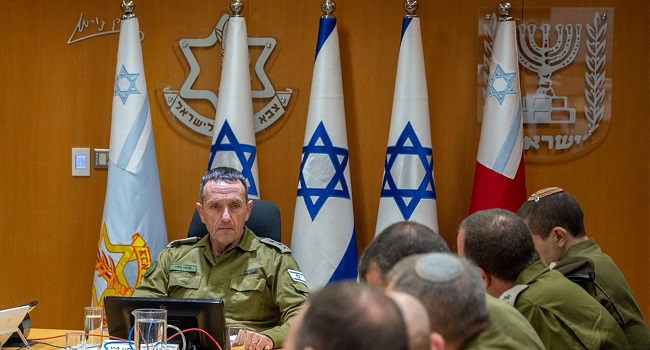Israel’s army chief on Monday vowed a response to Iran’s unprecedented attack against the country which has prompted appeals for de-escalation by world leaders fearing wider conflict. Six months of war between Israel and the Palestinian militant group Hamas in Gaza have triggered violence across the region involving Iranian proxies and allies who say they act in support of Palestinians in the Gaza Strip. But tensions have surged even higher with Tehran’s first direct assault on Israel, in retaliation for a deadly April 1 strike on Iran’s consulate in Damascus. “This launch of so many (Iranian) missiles, cruise missiles, and UAVs into the territory of the State of Israel will be met with a response,” Israeli army chief General Herzi Halevi said, addressing troops at the Nevatim military base hit in Iran’s Saturday barrage. But the military also said it would not be distracted from its war against Hamas in Gaza. The United Nations on Monday cited reports of “air strikes, shelling and heavy fighting” for the past five days around Nuseirat refugee camp in the central Gaza city of Deir al-Balah. Engaged in terrorism’ Iran launched more than 300 drones and missiles at Israel late Saturday, according to Israel’s military which said nearly all were intercepted. Israeli Prime Minister Benjamin Netanyahu met with his war cabinet late Monday to discuss possible reactions, local media said, as Israel issued its first official comment on the deadly Syria strike. “These were people who engaged in terrorism against the State of Israel,” military spokesman Rear Admiral Daniel Hagari said. “There was not a single diplomat there as far as I know.” Iran’s Islamic Revolutionary Guard Corps named two generals as among seven of its members killed in the consular attack. Tehran says its missile and drone barrage against Israel was the first act of a tough new strategy. The Iranian president’s political deputy, Mohammad Jamshidi, wrote on X that the “era of strategic patience is over” and further targeting Iranian personnel and assets “will be met with a direct and punishing response.” Tehran said it considered the matter “concluded” unless Israel chose to commit “another mistake”. Israel’s top military supplier the United States played a key role — with other allies — in shooting down the Iranian drones. US officials, increasingly critical of the civilian death toll in Gaza, have urged caution on Israel after Iran’s attack. “We don’t seek escalation, but we’ll continue to support the defence of Israel and to protect our personnel in the region,” said Secretary of State Antony Blinken. US President Joe Biden has told Netanyahu that Washington would not offer military support for any retaliation against Iran, according to a senior US official. Netanyahu has been less vocal than usual since Iran’s attack, but late Monday he said on X that the international community “must continue to stand united in resisting this Iranian aggression, which threatens world peace.” At the White House Biden, meeting Iraq’s Prime Minister Mohamed Shia al-Sudani, said: “We’re committed to a ceasefire that will bring the hostages home and prevent the conflict spreading beyond what it already has.” Israel estimates that 129 hostages, including 34 presumed dead, remain in the hands of Palestinian militants in Gaza since their October 7 attack triggered the war with Israel. Bridge blocked Reflecting both the domestic pressure Biden is under, and global calls for a ceasefire in Gaza, pro-Palestinian demonstrators blocked San Francisco’s Golden Gate Bridge on Monday. The UN cited reports of clashes between Israeli forces and Palestinian armed groups in eastern Rafah, Gaza’s southernmost city which Israel has for two months threatened to invade in pursuit of Hamas. Hamas’s October 7 attack resulted in the deaths of 1,170 people in Israel, mostly civilians, according to Israeli figures. Israel’s retaliatory offensive has killed at least 33,797 people in Gaza, mostly women and children, according to the health ministry in the Hamas-run territory. The toll rose by at least 68 deaths over 24 hours. Israel released around 150 detainees on Monday who had been rounded up in Gaza, the territory’s crossings authority told AFP. The agency alleged “mistreatment” of the detainees, which Israel’s military denied. Further emphasising the regional dimensions of the war, Israel’s army said four of its troops were wounded inside Lebanese territory after Hezbollah said it had targeted a group of Israeli soldiers with “explosive devices” when they crossed the border. Catastrophic hunger’ Following the Iranian attack, the UN Security Council held an emergency meeting Sunday, where Secretary-General Antonio Guterres warned the region was “on the brink” of war and called for a defusing of tensions. On Monday Britain, Germany, Italy and France were among those also calling for de-escalation. A United States official said the hope was that “in the light of day” Israel would see it had won a “spectacular success” against Iran’s attack, which resulted in no reported deaths. However, Middle East analyst James Ryan said “Netanyahu has already shown a willingness to test any kind of limit Biden wishes to impose”. Netanyahu, who leads a coalition including religious and ultra-nationalist parties, has faced regular protests by anti-government demonstrators as well as supporters of the Gaza hostages demanding the government get them home. Experts, and the protesters, have said they expect Netanyahu to continue the Gaza war as a tactic to remain in power. British airline EasyJet on Monday said it was pausing flights to and from Tel Aviv until April 21, “due to the evolving security situation,” but on global markets world oil prices sank as traders bet on a de-escalation of tensions. The UN said it delivered on Sunday a four-day supply of fuel to enable a Gaza City bakery to resume operations in northern Gaza, which “has largely been cut off from aid and has recorded the highest levels of catastrophic hunger in the world.” AFP














